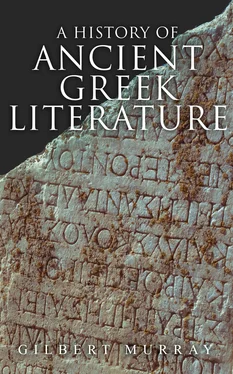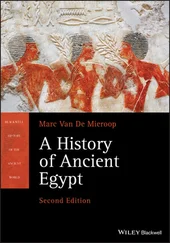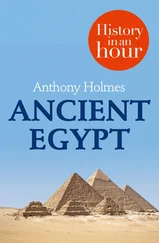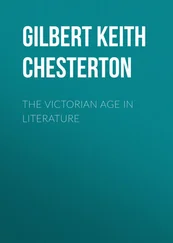If Æschylus ever called his plays 3"slices from the great banquets of Homer," the banquets he referred to must have been far richer than those to which we have admission. In all his ninety plays it is hard to find more than seven which take their subjects from our Homer, including the Agamemnon and Choëphoroi, 4and it would need some spleen to make a critic describe these two as 'slices' from the Odyssey. What Æschylus meant by ' Homer'was the heroic saga as a whole. It is the same with Sophocles, who is called 'most Homeric,' and is said by Athenæus (p. 277 ) to "rejoice in the epic cycle and make whole dramas out of it." That is, he treated those epic myths which Athenaeus only knew in the prose 'cycles' or handbooks compiled by one Dionysius in the second century B.C., and by Apollodôrus in the first. To Xenophanes ( sixth century) ' Homer and Hesiod' mean all the epic tradition, sagas and theogonies alike, just as they do to Herodotus when he says (ii. 53), that they two "made the Greek religion, and distributed to the gods their titles and honours and crafts, and described what they were like." There Herodotus uses the conventional language; but he has already a standard of criticism which is inconsistent with it. For he conceives Homer definitely as the author of the Iliad and Odyssey. He doubts if the Lay of the Afterborn * be his, and is sure (ii. 117) that the Cypria * cannot be, because it contradicts the Iliad. This is the first trace of the tendency that ultimately prevailed. Thucydides explicitly recognises the Iliad, the Hymn to Apollo, and the Odyssey as Homer's. Aristotle gives him nothing but the Iliad, the Odyssey, and the humorous epic Margîtes. * Plato's quotations do not go beyond the Iliad and the Odyssey; and it is these two poems alone which were accepted as Homer's by the great Alexandrian scholar Aristarchus (ca. 160 B.C.), and which have remained ' Homeric' ever since.
How was it that these two were originally selected as being ' Homer' in some special degree? And how was it that, in spite of the essential dissimilarities between them, they continued to hold the field together as his authentic work when so many other epics had been gradually taken from him? It is the more surprising when we reflect that the differences and inconsistencies between them had already been pointed out in Alexandrian times by the 'Chorizontes' or 'Separators,' Xenon and Hellanicus.
ILIAD AND ODYSSEY: THE PANATHENAIC RECITATION
A tradition comes to our aid which has been differently interpreted by various critics -- the story of the recension by Pisistratus, tyrant of Athens, in the middle of the sixth century. Late writers speak much of this recension. "Vox totius antiquitatis" is the authority Wolf claims for it. It is mentioned in varying terms by Cicero, Pausanias, Ælian, Josephus; it is referred to as a well-known fact in a late epigram purporting to be written for a statue of "Pisistratus, great in counsel, who collected Homer, formerly sung in fragments." Cicero's account is that Pisistratus "arranged in their present order the books of Homer, previously confused." The Byzantine Tzetzes -- the name is only a phonetic way of spelling Cæcius -- makes the tradition ludicrous by various mistakes and additions; his soberest version says that Pisistratus performed this task "by the help of the industry of four famous and learned men -- Concylus, Onomacritus of Athens, Zopyrus of Heraclea, and Orpheus of Crotona." Unfortunately, the learned Concylus is also called Epiconcylus, and represents almost certainly the 'Epic Cycle,' ἐπτκν κύκλου, misread as a proper name! And the whole commission has a fabulous air, and smacks of the age of the Ptolemies rather than the sixth century. Also it is remarkable that in our fairly ample records about the Alexandrian critics, especially Aristarchus, there is no explicit reference to Pisistratus as an editor.
It used to be maintained that this silence of the Alexandrians proved conclusively that the story was not in existence in their time. It has now been traced, in a less developed form, as far back as the fourth century B.C. It was always known that a certain Dieuchidas of Megara had accused Pisistratus of interpolating lines in Homer to the advantage of Athens -- a charge which, true or false, implies that the accused had some special opportunities.
It was left for Wilamowitz to show that Dieuchidas was a writer much earlier than the Alexandrians, and to explain his motive. 5It is part of that general literary revenge which Megara took upon fallen Athens in the fourth century. "Athens had not invented comedy; it was Megara. Nor tragedy either; it was Sikyon. Athens had only falsified and interpolated!" Whether Dieuchidas accepted the Pisistratus recension as a fact generally believed, or whether he suggested it as an hypothesis, is not clear. It appears, however, that he could not find any un-Attic texts to prove his point by. When he wished to suggest the true reading he had to use his own ingenuity. It was he who invented a supposed original form for the interpolated passage in B, 671; and perhaps he who imagined the existence of a Spartan edition of Homer by Lycurgus, an uncontaminated text copied out honestly by good Dorians!
The theory, then, that Pisistratus had somehow 'interpolated Homer' was current before Alexandrian times. Why does Aristarchus not mention it? We cannot clearly say. It is possible that he took the fact for granted, as the epigram does. It is certain, at any rate, that Aristarchus rejected on some ground or other most of the lines which modern scholars describe as 'Athenian interpolations'; and that ground cannot have been a merely internal one, since he held the peculiar belief that Homer himself was an Athenian. Lastly, it is a curious fact that Cicero's statement about the recension by Pisisstratus seems to be derived from a member of the Pergamene school, whose founder, Crates, stood almost alone in successfully resisting and opposing the authority of Aristarchus. It is quite possible that the latter tended to belittle a method of explanation which was in particular favour with a rival school.
Dieuchidas, then, knows of Pisistratus having done to the poems something which gave an opportunity for interpolation. But most Megarian writers, according to Plutarch ( Solon, 10), say it was Solon who made the interpolations; and a widespread tradition credits Solon with a special law about the recitation of ' Homer' at the Festival of the Panathenæa. This law, again, is attributed to Hipparchus in the pseudo-Platonic dialogue which bears his name -- a work not later than the third century. Lycurgus the orator ascribes it simply to 'our ancestors,' and that is where we must leave it. When a law was once passed at Athens, it tended to become at once the property of Solon, the great 'Nomothetês.' If Pisistratus and Hipparchus dispute this particular law, it is partly because there are rumours of dishonest dealings attached to the story, partly because the tyrants were always associated with the Panathenæa.
But what was the law? It seems clear that the recitation of Homer formed part of the festal observances, and probable that there was a competition. Again, we know that the poems were to be recited in a particular way. But was it 'by suggestion' -- at any verse given? That is almost incredible. Or was it 'one beginning where the last left off'? Or, as Diogenes Laertius airily decides, did the law perhaps say εξ υποβολης, and mean εξ υποληψεως? 6
Our evidence then amounts in the first place to this: that there was a practice in Athens, dating at latest from early in the fifth century, by which the Homeric poems were recited publicly in a prescribed order; and that the origin of the practice was ascribed to a definite public enactment. We find further, that in all non-Athenian literature down to Pindar, ' Homer' seems to be taken as the author of a much larger number of poems than we possess -- probably of all the Trojan and Theban epics -- whereas in Attic literature from the fifth century onwards he is especially the author of the Iliad and the Odyssey, the other poems being first treated as of doubtful authorship, afterwards ignored. When we add that in the usage of all the authors who speak of this Panathenaic recitation, ' Homer' means simply, and as a matter of course, the Iliad and the Odyssey, the conclusion inevitably suggests itself that it was these two poems alone which were selected for the recitation, and that it was the recitation which gave them their unique position of eminence as the 'true' Homer.
Читать дальше












